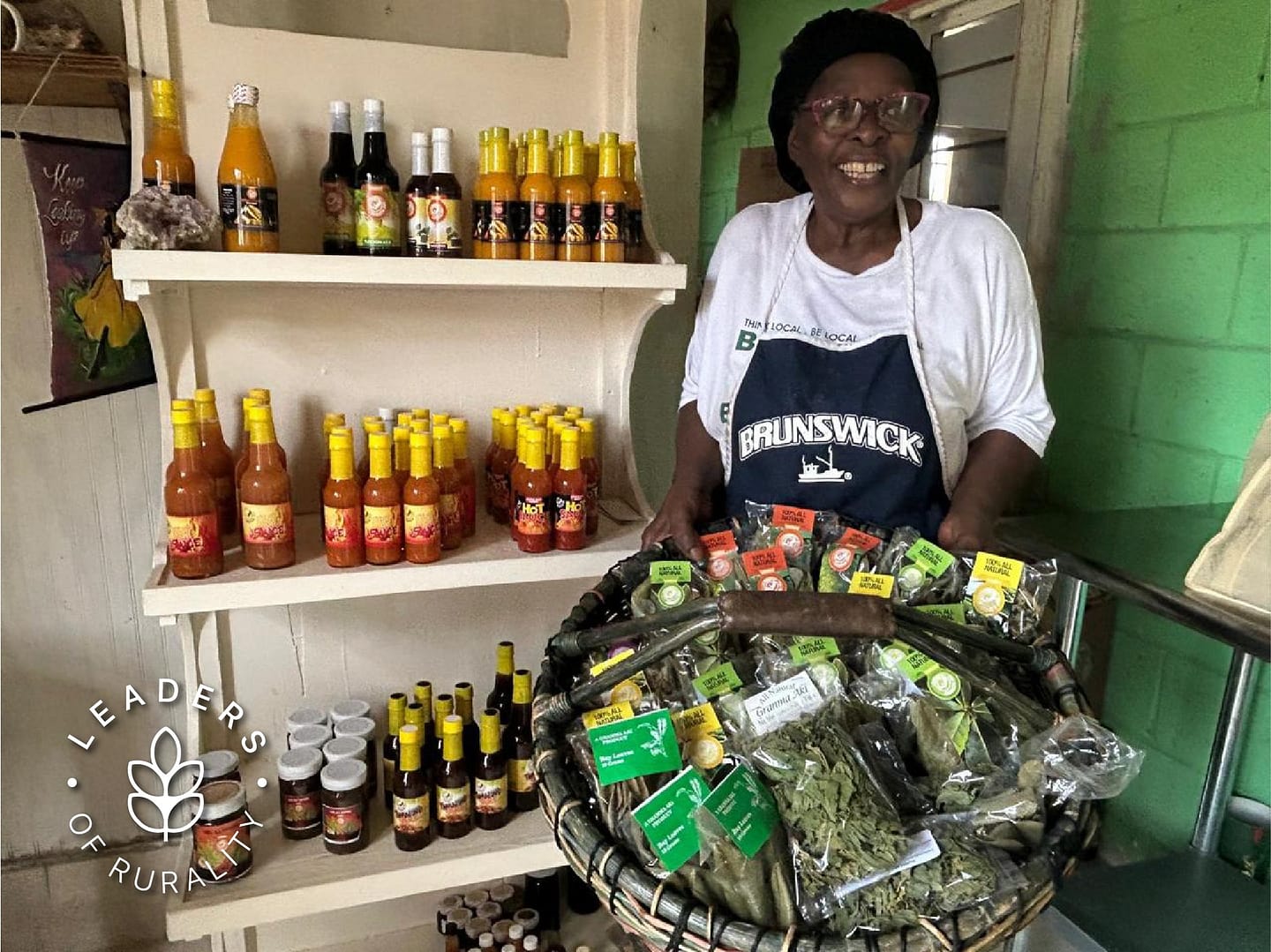
Novella Payne, a producer and agro-processor dedicated to agriculture, rural communities, and local gastronomy in Antigua and Barbuda, recognized by IICA as a Leader of Rurality of the Americas
Novella Payne is the founder of the company Granma Aki, and she chaired the Antigua and Barbuda Rural Women Producers Association for six years, where she was known as the “bulldozer woman”, capable of opening doors and securing support for her group.
Saint John, 3 October 2025 (IICA). The story of Novella Payne is that of a woman who reinvented herself, returned to her roots, and built—through vision and hard work—an enterprise that today stands as a symbol of the value of rural life in Antigua and Barbuda. Founder of the company Granma Aki, Payne describes herself as an “agro-processor”, a term that reflects her ability to transform her country’s agricultural wealth into value-added products that reach supermarkets, hotels, and households both within and beyond the Caribbean.
For her work as a producer, value creator, and promoter of her country’s culinary culture, Payne has been recognized as one of the Leaders of Rurality of the Americas by the Inter-American Institute for Cooperation on Agriculture (IICA). She will receive the Soul of Rurality award, created by IICA to highlight the work of those who leave a mark in favor of sustainability in the region and the world, and of food and nutrition security.

Born in Antigua, Payne spent much of her childhood and youth in England, where her parents had emigrated. There she received formal education and raised her children, but she always knew she would one day return to her homeland. This became a reality in 1987, when her children were grown and she could embark on a new stage of her life. Before entering the agro-industry, she opened a beauty salon in the area of the historic Nelson’s Dockyard in Antigua, which she managed for seven years.
However, she soon realized that this path did not align with her values. “One day I stood at the door of my salon and said: I think God doesn’t want me to keep turning natural into artificial”, she recalls. That was when she closed the doors and turned to the land.
The inspiration had always been there, in her childhood memories: walks through the woods, her grandmother’s teachings about herbs and medicinal teas, her love of plants and fruits. Building on that, Payne began working on her farm with lemongrass and soursop, gradually adding mangoes, tamarind, starfruit, Surinam cherries, and other local fruits. From these raw materials came her teas, sauces, jams, and sweets. Over time, she also developed drying and preservation techniques that allowed her to diversify her offerings. Today, Granma Aki products can be found in leading supermarkets and hotels in Antigua and Barbuda, and are even requested by customers in the United States and Canada, she proudly shares.
One of the most defining moments for Payne was her first sale to a local supermarket. With just two varieties of tea—soursop and lemongrass—and very basic labels, she managed to sell 18 dollars’ worth of products to a major chain. “I was so excited when I realized that this supermarket believed in my vision”, she recalls. Those initial orders later grew to 500 dollars—modest but significant for the early days of her company. Today, the island’s leading chains and several hotels carry her products on their shelves and menus, the Antiguan producer affirms.

Payne not only processes and markets agricultural products but also champions her country’s traditional cuisine.
Yes, it can be done
Her path was not easy. Payne acknowledges that being a woman entrepreneur in her country posed significant challenges. “It’s not easy. You have to be strong and believe in yourself”, she says. That is why, from the very beginning, she also sought to show other rural women that it is possible to generate income from the land. Starting with small containers, then larger gardens, and eventually commercial production. “It saddens me when I see women who think they can’t make it. I try to show them that yes, they can”, she emphasizes.
In this journey, IICA’s support was key. Specialists from the institution assisted her at different times: with soil analyses for her farm, technical advice on fruit drying, contacts to design and build her dryer, and even opportunities to attend workshops and internships in other Caribbean islands. “They told me I could do it, showed me how, and connected me with the right people. That support allowed me to grow”, she stresses.
Her leadership also led her to preside over the Antigua and Barbuda Rural Women Producers Association for six years—far longer than initially planned, since no one else wanted to take on the responsibility, she explains. There she was known as the “bulldozer woman”, capable of opening doors and securing support for her group. One of the most significant moments of her international career as part of the association was her participation in a meeting in Fiji, where she surprised the audience with a simple, heartfelt speech about her life in the countryside and her commitment to rural production. “I don’t remember everything I said, but afterwards many people came up to tell me it had been the best presentation of the event”, she says, amused and satisfied.
Ingredient: love
In her work as an agro-processor, Payne repeats a motto that sums up her philosophy: “all natural”. She rejects artificial preservatives and says her true secret ingredient is love. “When people ask me what preservative I use, I say: love, L-O-V-E. That’s my preservative”, she says with humor. She often includes the word on her labels, convinced that care and dedication in production are also passed on to those who consume her teas and sauces.
The cultural identity of Antigua and Barbuda is another cornerstone of her work. Payne not only processes and markets agricultural products but also defends her country’s traditional cuisine. One example is ducana, a dish made with grated sweet potato, coconut, and spices, wrapped in banana leaves and cooked, traditionally served with salt fish and vegetables. Payne champions the original recipe over the modern version with raisins, which she argues turns it into a dessert. The debate over this dish crossed the island’s borders and even reached the BBC, which reported on the “ducana raisin controversy” as a reflection of the importance of Caribbean culinary traditions.
Another staple of local gastronomy is fungi, a corn-based dish similar to European polenta, served in Antigua as round dumplings accompanied by fish or meat with vegetables. Payne describes it enthusiastically, just as she does vegetable soups combining sweet potato, pumpkin, eddoe, and other ingredients, sometimes with meat or chicken, though she prefers to cook them only with vegetables and plenty of seasoning. “If you pass by my house when I’m making soup, you’ll definitely want to come in and taste it”, she says with a smile.
Beyond her company and her leadership in rural associations, Payne also promotes agritourism in Antigua. Although she admits the sector is developing slowly, she is confident the island’s natural wealth can become an attraction for visitors seeking authentic experiences tied to farming and local cuisine.
Today, with her grandchildren—whom she also involves in the business—Payne passes on her passion for the land and pride in rural traditions. “In my garden I have everything: medicinal plants, fruit trees, ornamentals. It’s an open space for anyone who wants to enjoy it. I call it random gardening: a little bit of everything”, she explains.
Aware of the obstacles but convinced that the future lies in producing more and better from the land, Novella remains firm in her goal: to strengthen the domestic market, reach regional markets, and ultimately expand internationally. “For me, the sky is the limit”, she affirms. Her story is, in short, that of a woman who returned to her roots to prove that rural life is not only possible but also a source of innovation, cultural pride, and community development.
Novella seeks to inspire other rural women by showing that it is possible to generate income from the land, all the way up to production for commercial purposes.
About IICA
IICA is the specialized agency for agriculture in the Inter-American system, with a mission to encourage, promote and support its 34 Member States in their efforts to achieve agricultural development and rural well-being through international technical cooperation of excellence.
More information:
Institutional Communication Division.
Advertise with the mоѕt vіѕіtеd nеwѕ ѕіtе іn Antigua!
We offer fully customizable and flexible digital marketing packages.
Contact us at [email protected]















Well done Granma Aki
Nuff respect
My amazing auntie. God has truly blessed her with a green thumb. Congratulations
Love it 🙏🏿❤️🙏🏿❤️👍🏾
Congratulations. Your hard work have not gone unnoticed
Brilliant. So proud of you sis
Comments are closed.